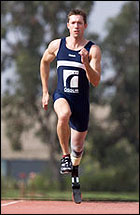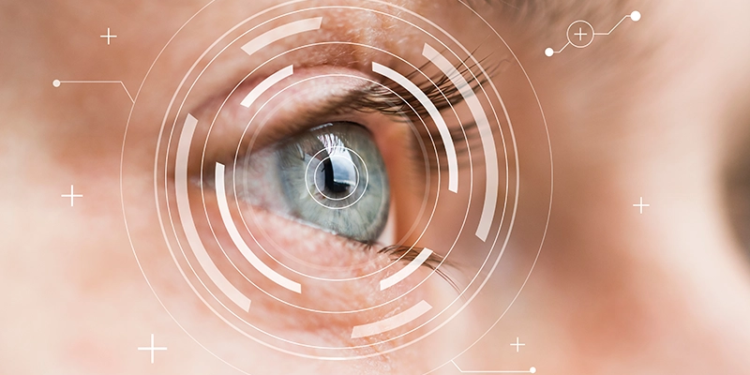
Brian Frasure’s story is the stuff of sports legend. In 1992, Frasure, CP, was a highly promising freshman runner at the University of North Carolina, Raleigh, whose early victories were based on raw, untrained talent. That year, he also developed a dangerous taste for train-hopping. One September night, he slipped off a fast-moving freight car and landed under the train’s wheels. Most of the toes on his left foot were severed, and his right foot was mangled beyond saving. Within two years, however, his talent and extraordinary grit won out, and he was tagged by a world-record-holding coach as Paralympic sprinting’s potential next champion.
Now, at 35, Frasure’s overloaded trophy case includes a 2008 Paralympic world-record gold medal in the 4 x 100m relay, and he has triumphed over a doping scandal that could have destroyed his career. A prosthetist for Ossur Americas, Frasier travels more than 100,000 miles per year, working mainly with veterans. He also gives motivational speeches to clients that include IBM, universities, and public school groups. He recently talked with The O&P EDGE about inspiration, the untold truth behind the doping verdict, and why he’s retiring at the top of his game.
The O&P EDGE:
Congratulations on your performance in Beijing, Brian. I’ve been hearing you talk retirement since Athens. You recently told a reporter that age-wise, you’re “past your prime as a world-class athlete,” but you posted some incredible times. So, are you really retiring or are you secretly shooting for London?
Frasure:
(Laughs) No, I won’t pull a Jordan again. This year, my body really struggled to keep up with training and performing at that level. And it would be really hard to top Beijing. More people came to the 100m final there than to that event at the last three Paralympics combined. This gives me the chance to finish on my own terms.
The O&P EDGE:
From 1996 to 2008, you took home some 30 gold medals and first-place finishes in major competitions, plus eight world records. Between 1997 and 2003, you were basically untouchable. But now you’re racing with and against a significant field of people who are running at your level and sometimes even faster. You even fit Oscar Pistorius with his first Cheetah® Flex feet, which he then used to break your own world record. What’s that like for you?
Frasure:
Honestly, it’s really part of the realization of my dream to see Paralympic sports grow. A lot of people asked me, “Why would you help one of your competitors to run faster?” Being a prosthetist and having an engineering background, it would really be a shame and selfish of me not to share knowledge with other athletes, whether they’re my competitors or not. It is bittersweet; I don’t like to get beat by anybody. But at the same time, meeting people and getting attached to them, and playing a role in their achieving their own goals is special.
The O&P EDGE:
When you’re giving a motivational speech to kids, what’s the most important thing you say to them?
Frasure:
Well, I really try to hit decision-making. The way I lost my leg, it’s pretty evident that it wasn’t good decision making (Laughs). But then I tie that into how, when you do make mistakes or encounter adversity, it’s definitely not the end of the world-and in fact, you can take that and turn it into something positive if you set goals and never become complacent. I also tell them how stopping to think about any situation, even for a few seconds, helps prevent bad snap decisions. And I tell them, you can’t always be thinking about yourself-you have ask, “How could this impact the people that I care about and the people that are with me?”
The O&P EDGE:
What’s your perspective on your accident now?
Frasure:
Sometimes I get raised eyebrows when I tell people this, but if I could do it all over again, I wouldn’t change a thing. When I step back now, 16 years later, and look at how my life has evolved, the doors that have been opened, the people that I’ve come in contact with, and the number of people that I’ve been able to help, that far outweighs what I had to go through in my initial year.
The O&P EDGE:
So thinking about your past, after the 2000 Sydney Paralympics, one of your medals was stripped and you were given a four-year ban from competing because you tested positive for nandrolone. Then the IPC [International Paralympic Committee] ruled that it was an accidental use, from supplements, and the ban was dropped. What really happened, and what perspective do you take from it?
Frasure:
Well, a lot of it never hit the press. The positive result was right after the 200m final. That race was so close that I literally dove for the line, and when I hit the ground, I got a grade 3 separation of my shoulder. They tested me right after that, when I was going through this trauma. Now, they had also tested me directly after the 100m semifinals and 100m finals, just one and two days before the 200m finals. Both of those tests were negative. Nandrolone is a form of testosterone, and a small amount of it occurs naturally in your body. I think IPC’s limit for how much you can have is two or three nanograms per milliliter of urine, and I tested at five or six nanograms. Athletes who are taking synthetic steroids are generally about 1,000 times over that limit. I said, “Look guys, something just isn’t right here. You’ve got two negative tests. Do you think that right before the 200m I’d take an amount of nandrolone that couldn’t conceivably be performance-enhancing, in the middle of the Paralympic Games?”
At the immediate hearing, my appointed defense barrister pulled up articles that showed how hormone levels elevate during physiological distress, which, with a grade 3 separation of my shoulder, I clearly had. But in the end, IPC took the stance that it was probably accidental ingestion from supplementation. And in that system, if it’s a positive test, it’s a positive test, no matter what the circumstances. They banned me for four years and stripped my 200m silver, but they allowed me to keep my medals from the 100m and the world record that I set in the 200m semifinal.
Obviously, I wasn’t going to let that rest, and I appealed to the Court of Arbitration of Sport [CAS]. To make a long story short, we filed that appeal two weeks past the CAS deadline, but CAS and IPC had reviewed all of my attorney’s documentation about the situation, and they agreed that it was inconclusive as to what had caused it, but that it wasn’t intentional. IPC lifted the ban and reinstated me, about nine months after Sydney. Obviously, the situation was pretty devastating for me because it brought a dark cloud over my reputation, and my reputation is more important to me than any medal, or anything I’ve done in the sport. My friends never doubted me, but there were athletes who just had it in their minds that I was cheating.
Once I was reinstated, IPC wanted to increase the amount that I was tested, and I said, “Fine. If anything, it’ll only validate the truth.” So I became the most highly tested Paralympic athlete. They showed up at my house at odd times and at all the meets, and I welcomed it. I guess it was a vindication for me to show up at Athens four years later, 31 years old, and about .3 seconds faster in the 100m than I ran in Sydney.
I understand why they have the rules in place that they do, and why they made the decision they did, but at the same time, those rules should be there to protect the athletes. And I didn’t feel they were using a lot of logic in that situation. But now, in the end, I’m fine. I’ve offset a lot of other adversity in my life. It was either going to make me bitter or it was going to make me a little bit stronger, and I try to choose to let things make me stronger.
Editor’s note: For more interviews with Paralympians and their prosthetists, see the related articles below.




